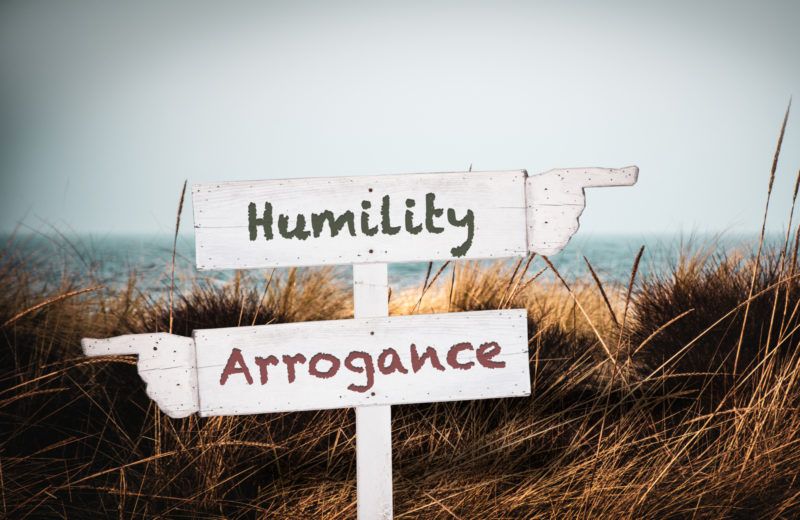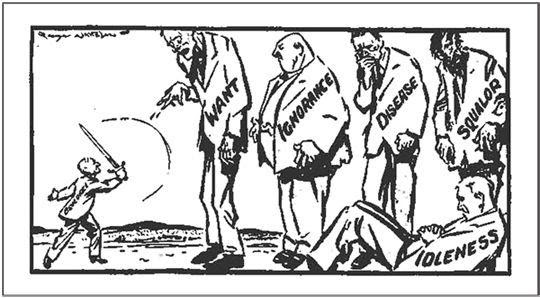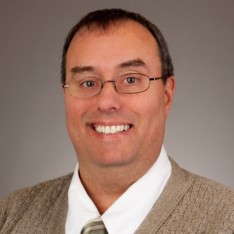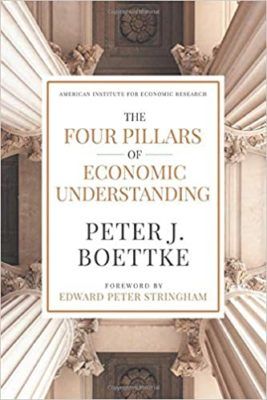It Is Not Our Ignorance that Will Kill Us, But Our Arrogance

Ignorance isn’t bliss. Ignorance is horrible. When the social reform movement in the late 19th and early 20th century emerged it took aim at five giants: want (poverty), ignorance (education), disease (public health), squalor (housing) and idleness (unemployment). From a social science point of view, heck from a humanitarian point of view, these do lead to misery and their eradication represents a worthy goal for any “Good Society.” As Adam Smith argued in The Wealth of Nations long ago, “No society can surely be flourishing and happy, of which the far greater part of the members are poor and miserable.” (Smith 1776, Bk I, chap 8, 88)
Economics was never heartless, and economists didn’t stand by in the face of human suffering and, as Dickens has Scrooge, declare: “If they would rather die,” “they had better do it, and decrease the surplus population.” As Carl Menger wrote in his Principles of Economics, man with his purposes and plans, and the means at his disposal to pursue them, is the beginning and end of economic analysis.
Ludwig von Mises, building on this Mengerian program in economic science titled his treatise simply Human Action and a core chapter early in the book demonstrates how “human society” is grounded in peaceful social cooperation achieved through productive specialization and mutually beneficial exchange. Economics, practiced in the tradition of the classical liberal political economist and the modern liberal political economists is humanistic in its method and humanitarian in its concern.
But that doesn’t mean policy deliberations to address want, ignorance, disease, squalor, and idleness are easy and straightforward. The question has always been what is the most effective way to address these social problems in a manner that reduces human suffering while encouraging the chances for human flourishing. There are always hard and difficult trade-offs, and economics as a discipline trains its practitioners to think in terms of trade-offs and to be attuned to unintended consequences.
The tragedy in human affairs is when policies chosen to reduce human suffering, especially among the most vulnerable, fail to do so, and in the process also reduce the opportunity for human flourishing. The communist experiments of the 20th century are the more egregious examples of tragic consequences, but one could reasonably point to the historical experiences with social democratic welfare policies/politics as well that have destroyed lives, families and communities all in the noble effort at slaying the five giants.

The failure and frustration of the modern welfare state to effectively address social problems while threatening to bankrupt their respective economies is what led to at least a modicum of reconsideration by policy elites over the past 30-40 years throughout Europe and the US. A close examination of the public finances in the western social democracies should give pause to any simpleminded claim, if spending is any indicator, that a conscious effort was made to abandon our collective efforts to slay the giants.
Vito Tanzi’s Government versus Markets (2011) provides a balanced overview of the tax burden and public spending. Tanzi for decades was the Director of Fiscal Affairs at the IMF, so he had a front row seat to the changing and expanding role of the state in economic affairs of the Western democracies. Lawrence Kotlikoff and Scott Burns in their The Clash of Generations (2012), argue using the basic analytics of intergenerational accounting that the US public economy is bankrupt, not in 50 years, but right now.
They document how the political system has produced a six-decade plus, off-balance-sheet, unsustainable financing scheme to pay for not only the ordinary business of politics, but our foreign adventures and our domestic desires to address social problems. And, any analysis of this growth of government in both scale and scope would be woefully inadequate if it didn’t take into account the vested interest groups that form around each of the initiatives.
Again, pointing this out isn’t heartless, it is social science. We choose policy paths and government spending is committed to pursue those paths and not others, and those decisions have consequences that we can study. Deliberating about trade-offs does not commit one to this side or that side of any issue; it just means conceptually that if the costs are greater than the benefit for any particular policy there better be an overwhelming moral consensus among the population for it to be judged “the right thing” to do. In most instances, the claim in fact was always that the “right thing” was also the “good thing” to do – translated into econospeak, the benefits of the policy choice will outweigh the costs of that choice.
The political economy of the “good society” strives to maximize the opportunities for human betterment and minimize the experience of human suffering. The debate among thinkers is one of means, not one of ends. We must engage in a civil yet contested conversation over economic policy and human welfare.
In Deirdre McCloskey’s Why Liberalism Works (2019) she asks her readers to just listen, to really listen, to the other side, and to weigh the historical evidence and moral thrust of the argument for liberalism. She admits that liberalism has been imperfectly pursued, but even an imperfect liberalism has delivered unimagined benefits not just in terms of our material well-being.
Imagine, she asks us, to consider what a fully consistent liberalism might deliver for us. But to achieve that, we have to give up our arrogance and our will to rule over others. We are instead, one another’s dignified equals. And, we are called to interact with one another accordingly, with mutual respect for each other. A society of self-governors doesn’t need a nanny, let alone a boss, to guide and direct us.
In The Wealth of Nations (1776, Book IV, chap. 9, 183) talks about “the liberal play of equality, liberty, and justice.” And, as he writes later in that chapter:
All systems either of preference or of restraint, therefore, being thus completely taken away, the obvious and simply system of natural liberty establishes itself of its own accord. Every man, as long as he does not violate the laws of justice, is left perfectly free to pursue his own interest his own way, and to bring both his industry and capital into competition with those of any other man, or order of men. The sovereign is completely discharged from a duty, in the attempting to perform which he must always be exposed to innumerable delusions, and for the proper performance of which no human wisdom or knowledge could ever be sufficient; the duty of superintending the industry of private people, and of directing it towards the employment most suitable to the interests of the society. (ibid., 208, emphasis added)
Smith’s good friend David Hume argued that in crafting the institutions of government, we would be wise to assume all men are knaves. By this he meant opportunistic power seekers intent on acquiring for themselves fame and fortune. Smith certainly understood this form of opportunistic motive in man, but he is addressing himself to something slightly different in the above passage, and that is ideological delusion and arrogance.
In the paragraph immediately following his famous invisible hand passage, Smith actually writes that: “The statesman, who should attempt to direct private people in what manner they ought to employ their capitals, would not only load himself with a most unnecessary attention, but assume an authority which could safely be trusted, not only to no single person, but to no council or senate whatever, and which would no-where be so dangerous as in the hands of a man who had folly and presumption enough to fancy himself fit to exercise it.” (Smith 1776, Book IV, chap. 2, 478, emphasis added)
In the closing passages of Elinor Ostrom’s Governing the Commons (1990, 215) she states that the “intellectual trap” of much of modern economic theory and public policy is that scholars “presume that they are omniscient observers able to comprehend the essentials of how complex, dynamic systems work by creating stylized descriptions of some aspects of those systems.” This is what their models enable them to do if they come to be exclusively relied upon. The implication for public discourse is damaging because this enables the social scientist to assume the mantle of advisor to a government presiding over a society. “With the false confidence of presumed omniscience,” Ostrom continues, “scholars feel perfectly comfortable in addressing proposals to governments that are conceived in their models as omnicompetent powers able to rectify the imperfections that exist in all field settings.”
It is not our ignorance that kills us, it is our arrogance. This is Hayek’s “fatal conceit,” and it is not limited to the would-be socialist planner, but permeates modern social science and politics. Rather than trade-offs, we get one-size-fits-all solutions. Rather than binding rules, we get discretionary authority. Rather than listening and learning from one another, we get a rigid insistence that one side is right and all other viewpoints are either woefully ignorant of the science, or morally bankrupt, or some combination of both.
So join me in collectively repeating the following — I do not know what is best for everyone to do. If we internalize that, we begin to realize that is true for everyone. This prevents us from falling prey to what Adam Smith referred to as innumerable delusions. There is no panacea to our social ills. There are social ills, but there is no one size fits all solution to it.
Let me be clear. There are experts in science, in art, and in culture (including sports). I prefer painting my Mondrian to the watercolors of one of my old professors who painted for fun, and I prefer to watch my Yankees play, rather than a battle of softball teams between two bar teams along the Jersey shore of my youth. And, I want to listen to scientists and learn from them. But listening and learning doesn’t mean blindly following. Let me be clear again – I DO NOT KNOW – so that means I must try to learn, and that requires listening.
What I do know, and can say with more confidence, is that people are people, and that we all face incentives in making our decisions, and we rely on flows of information to inform those decisions. When I hear a politician talk, I understand that whatever they say it is against the constraint that they must garner votes and campaign contributions to continue being a politician. When I hear a journalist talk, I understand that they do so against the constraint that they must grab my attention in a world full of activities that could draw my attention away from them.
And, when I hear an expert speak, I understand that they have a position and reputation to maintain in the public space, and that is the constant constraint against which they weigh how and what they will say. So, when I hear a question about on-the-ground contradictory facts being raised to an expert, and the expert answers by retreating to the forecasts of their model unencumbered by that tough empirical check implied in the question, my critical antennae go on high alert.
And, when I hear a political leader asked about policies put in place under one set of assumptions which have proved to be off – sometimes by an order of magnitude – and they insist that they not only did the right thing but would do it again with all the information that has since been revealed in the actual historical experience, those critical antennae go up again.
Here is what I can say: question presumed authority, value earned authority, treat others with dignity and respect, as you would want them to treat you, and listen and learn. It is this path, rather than marching in lockstep with the crowd, that will lead to you balancing your trade-offs and choosing your appropriate risk preference, and living your life as a fallible but capable self-governing individual.












